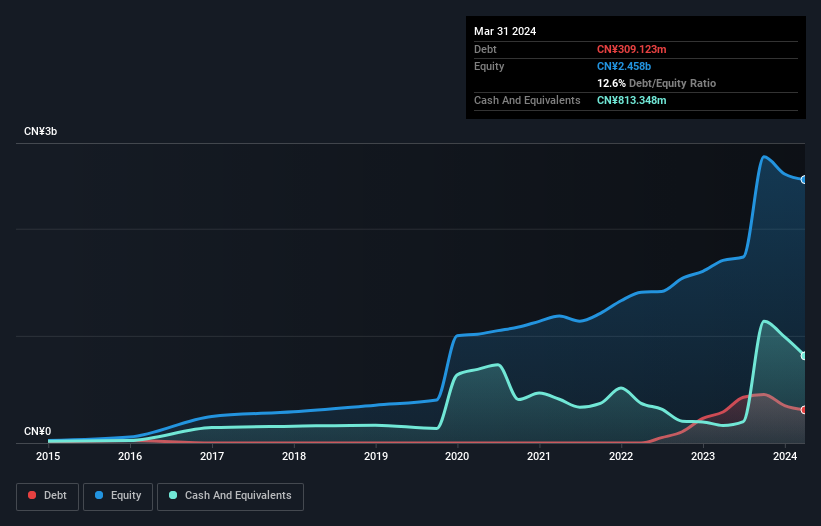
Legendary fund manager Li Lu (who Charlie Munger backed) once said, 'The biggest investment risk is not the volatility of prices, but whether you will suffer a permanent loss of capital.' So it seems the smart money knows that debt - which is usually involved in bankruptcies - is a very important factor, when you assess how risky a company is. We can see that Shanghai Medicilon Inc. (SHSE:688202) does use debt in its business. But is this debt a concern to shareholders?
When Is Debt A Problem?
Generally speaking, debt only becomes a real problem when a company can't easily pay it off, either by raising capital or with its own cash flow. In the worst case scenario, a company can go bankrupt if it cannot pay its creditors. While that is not too common, we often do see indebted companies permanently diluting shareholders because lenders force them to raise capital at a distressed price. By replacing dilution, though, debt can be an extremely good tool for businesses that need capital to invest in growth at high rates of return. When we think about a company's use of debt, we first look at cash and debt together.
Check out our latest analysis for Shanghai Medicilon
What Is Shanghai Medicilon's Net Debt?
You can click the graphic below for the historical numbers, but it shows that as of March 2024 Shanghai Medicilon had CN¥309.1m of debt, an increase on CN¥289.2m, over one year. But on the other hand it also has CN¥813.3m in cash, leading to a CN¥504.2m net cash position.

How Healthy Is Shanghai Medicilon's Balance Sheet?
According to the last reported balance sheet, Shanghai Medicilon had liabilities of CN¥594.3m due within 12 months, and liabilities of CN¥62.1m due beyond 12 months. Offsetting these obligations, it had cash of CN¥813.3m as well as receivables valued at CN¥696.2m due within 12 months. So it can boast CN¥853.0m more liquid assets than total liabilities.
This surplus suggests that Shanghai Medicilon is using debt in a way that is appears to be both safe and conservative. Because it has plenty of assets, it is unlikely to have trouble with its lenders. Simply put, the fact that Shanghai Medicilon has more cash than debt is arguably a good indication that it can manage its debt safely. There's no doubt that we learn most about debt from the balance sheet. But it is future earnings, more than anything, that will determine Shanghai Medicilon's ability to maintain a healthy balance sheet going forward. So if you're focused on the future you can check out this free report showing analyst profit forecasts.
Over 12 months, Shanghai Medicilon made a loss at the EBIT level, and saw its revenue drop to CN¥1.2b, which is a fall of 33%. To be frank that doesn't bode well.
So How Risky Is Shanghai Medicilon?
Statistically speaking companies that lose money are riskier than those that make money. And in the last year Shanghai Medicilon had an earnings before interest and tax (EBIT) loss, truth be told. Indeed, in that time it burnt through CN¥169m of cash and made a loss of CN¥172m. With only CN¥504.2m on the balance sheet, it would appear that its going to need to raise capital again soon. Even though its balance sheet seems sufficiently liquid, debt always makes us a little nervous if a company doesn't produce free cash flow regularly. The balance sheet is clearly the area to focus on when you are analysing debt. However, not all investment risk resides within the balance sheet - far from it. To that end, you should be aware of the 2 warning signs we've spotted with Shanghai Medicilon .
At the end of the day, it's often better to focus on companies that are free from net debt. You can access our special list of such companies (all with a track record of profit growth). It's free.
New: Manage All Your Stock Portfolios in One Place
We've created the ultimate portfolio companion for stock investors, and it's free.
• Connect an unlimited number of Portfolios and see your total in one currency
• Be alerted to new Warning Signs or Risks via email or mobile
• Track the Fair Value of your stocks
Have feedback on this article? Concerned about the content? Get in touch with us directly. Alternatively, email editorial-team (at) simplywallst.com.
This article by Simply Wall St is general in nature. We provide commentary based on historical data and analyst forecasts only using an unbiased methodology and our articles are not intended to be financial advice. It does not constitute a recommendation to buy or sell any stock, and does not take account of your objectives, or your financial situation. We aim to bring you long-term focused analysis driven by fundamental data. Note that our analysis may not factor in the latest price-sensitive company announcements or qualitative material. Simply Wall St has no position in any stocks mentioned.
About SHSE:688202
Shanghai Medicilon
A drug discovery contract research organization, provides drug discovery and development services to pharmaceutical and biotechnology companies in China and internationally.
High growth potential and fair value.

